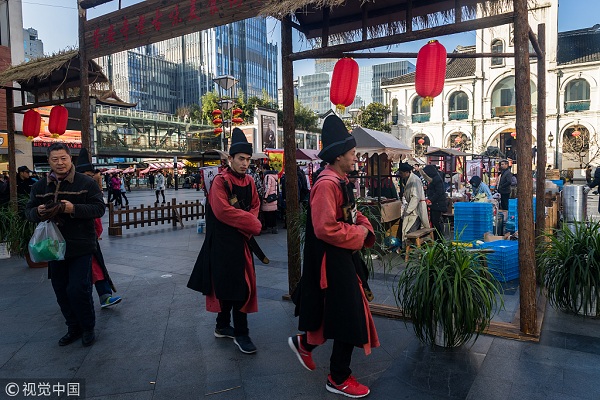Chongan Temple Pedestrian Street


Events held at Chongan Temple Pedestrian Street during the Spring Festival attract many visitors. [Photo/VCG]
Chongan Temple Pedestrian Street
崇安寺步行街(Chongansi Buxing Jie)
Located in downtown Wuxi, Chongan Temple Pedestrian Street is one of the most bustling commercial districts in the city and a national AAAA-level scenic area.
The pedestrian street was named after the Chongan Temple, the oldest temple in Wuxi. Established during the Eastern Jin Dynasty (317-420) with the name of Xingning, it was renamed Chongan Temple during the Song Dynasty (420-479).
Chongan Temple enjoys equal popularity with Shanghai's Chenghuang Temple, Suzhou's Xuanmiao Temple and Nanjing's Fuzi Temple as the four most distinctive pedestrian streets in the Jiangnan area, a region on the southern bank of the lower Yangtze River.
After the 1911 revolution, buddha statues in the temple were destroyed and the temple area was occupied. The main hall of Chongan Temple was burned to ashes during the War of Resistance Against Japanese Aggression (1937-45) and its burnt-out ruins were torn down after the liberation of Wuxi.
In 2003, the first phase of renovation projects at Chongan Temple was carried out. Based on several cultural relics in the area such as the former residence of Blind Abing, a famous folk musician originally from Wuxi, the former site of Wuxi Library and the former site of Xijin Garden, the area turned into a comprehensive pedestrian street integrating various functions such as commerce, dining, culture and relaxation.
MOST POPULAR
- 1 China Daily's 'Shopping in China' platform appeals to intl audiences
- 2 China updates Catalogue of Encouraged Industries for Foreign Investment
- 3 Policies concerning expats, foreign enterprises in December 2025
- 4 China becomes the world's fourth manufacturing power
- 5 China ascends global higher education ranking







